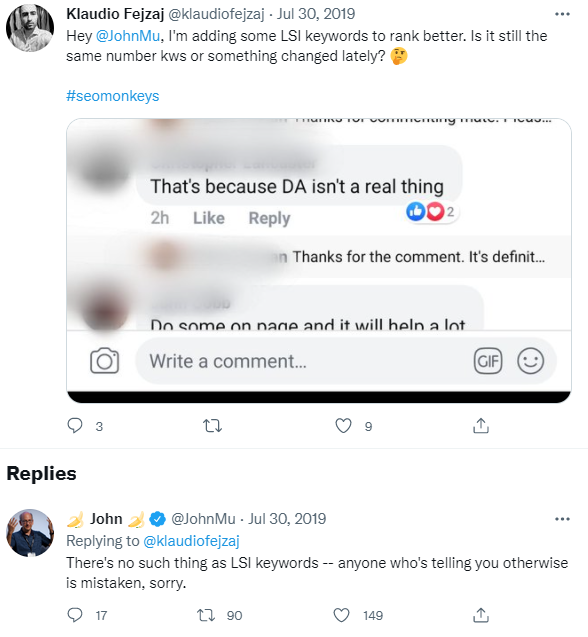Search engine technology has improved significantly over time, and SEO has evolved along with it.
One major change is the way in which keywords are used by search engines to identify the main topic of a page.
This brings us to the focus of this blog post: LSI keywords.
Never heard about it before? Don’t worry! We will cover the most important aspects of it:
- What is LSI?
- What are LSI Keywords?
- How do LSI Keywords relate to SEO?
- According to Google, LSI Keywords Don’t Exist
- The Importance of Using LSI Keywords in Your Content
- How to Use LSI Keywords for SEO
- Wrap Up: LSI Keywords are Real (Kind of)
What is LSI?
LSI stands for “Latent Semantic Indexing” and is used to analyze text.
The term originated before the internet became what it is today. In the 1980s, LSI was a computer program that was designed to learn a variety of synonyms and related words based on context.
It was used to classify documents, filter spam, score essays and summarize texts.
LSI programs compared terms to determine if they were related or not by seeing how many times each term was used in the content.
There are many words or expressions that can mean more than one thing. For example, the word “jaguar” can mean an animal, car, or sports team.
If the rest of the text discusses cars, then it’s likely that “jaguar” in this context is referring to a car.
What are LSI Keywords?
Well, LSI keywords are search terms you can use that are related to the main keyword you are targeting.
They add context and support your content to make it easier for readers and search engines to understand the subject or main topic of your content page.
They could be synonyms, but many are just connected somehow to the targeted keyword.
If your blog post is talking about digital marketing, for example, LSI keywords might be leads, SEO, social media, buying journey, campaigns, and data.
How do LSI Keywords relate to SEO?
During the early days of SEO, search engines would figure out the topic of a page based completely on the keywords found on the page.
If the content had the word “jaguar” over and over again, search engines would understand that the content was about jaguars.
A common practice was to create posts with numerous repetitions of the keyword.
This would make keywords from a page blatantly visible to the rudimentary search engine technology available then.
So, how are things now?
The repetition of keywords in content is called “keyword stuffing”, a black hat practice that is discouraged by Google.
Today, instead of looking for one keyword on a post, search engines try to understand a page’s overall topic. They can judge keywords via context.
Following this logic, it’s easy to assume that if you want your content to rank well, you should worry about including a lot of LSI keywords in it.
Right?
According to Google, LSI Keywords Don’t Exist
Here’s the thing.
There’s nothing written in stone, but it’s very likely that the biggest search engine in the world doesn’t acknowledge the existence of LSI keywords.
John Mueller, the Senior Webmaster Trends Analyst at Google, had publicly confirmed this:

The truth is that LSI is old technology, especially in a world with constant advancements in Artificial Intelligence and Natural Language Processing.
LSI was created for static content in the 1980s, and it’s hard to see its application on the always-changing internet.
So, should you ignore LSI keywords completely?
The Importance of Using LSI Keywords in Your Content
Google might not believe in LSI keywords, but it’s still trying to understand how words in a piece of content are connected.
The search engine will “read” your content because it must figure out the topic of a page to answer people’s questions — which means that the words you choose do matter.
Whether you call them LSI keywords or not, related keywords can improve your site’s SEO.
They are the ones helping Google understand your content topic.
Adding these terms helps you refrain from using your primary keyword too much and will offer more matches to your content.
The result is that more people will find your content.
But be advised: there’s no sense in stuffing LSI keywords in an unnatural way in your text.
You need to write for humans too, not just search engines, and your content should be high-quality and complete enough to answer a user’s intent.
How to Use LSI Keywords for SEO
It is possible to signal to Google what your page topic is about by inserting related keywords in prime areas.
For example, Google will scan your page to see if you use the term “jaguar” in your title tag, content headings, content, and image alt text.
But that’s not all search engines scan for.
Google will also scan for related keywords, so you can add them to your title, your subtitle or in-text headings as well as to your image alt fields.
Besides that, you can include them in the main body of content as a part of your description or story.
Remember that your page isn’t the only thing Google can check. It scans your entire website for improved contextual analysis.
Wrap Up: LSI Keywords are Real (Kind of)
In a few words, what’s the conclusion of our blog post?
It doesn’t matter if LSI keywords really exist and are an important element of your SEO strategy.
What matters is that you definitely should be including semantically related words in your content.
Search engines will like it and your audience will appreciate the result.
Speaking of that, a bullet-proof path to better website ranking on Google is understanding keywords and best practices for how they are used.
We can help you with that! All you have to do is click on our SEO maturity assessment!


![[WA] Ultimate Content Marketing Kit](https://rockcontent.com/wp-content/uploads/2022/08/Content-Marketing-Kit-750x200px.jpg)








